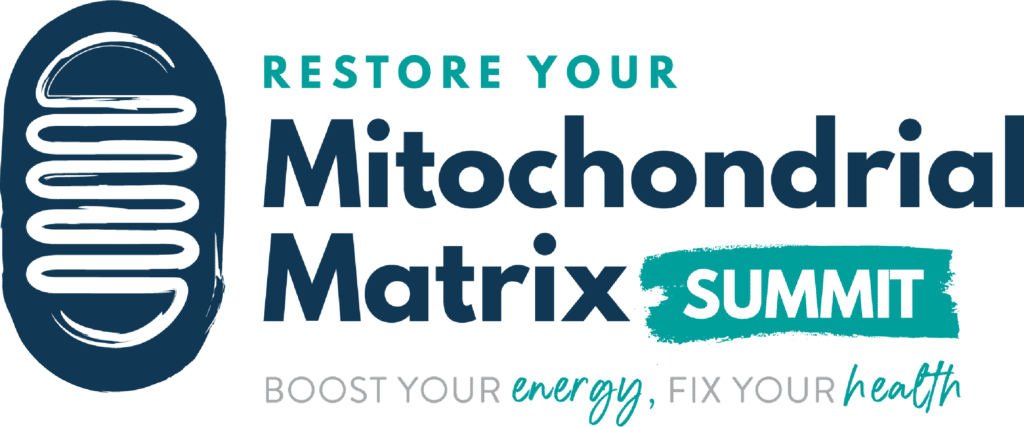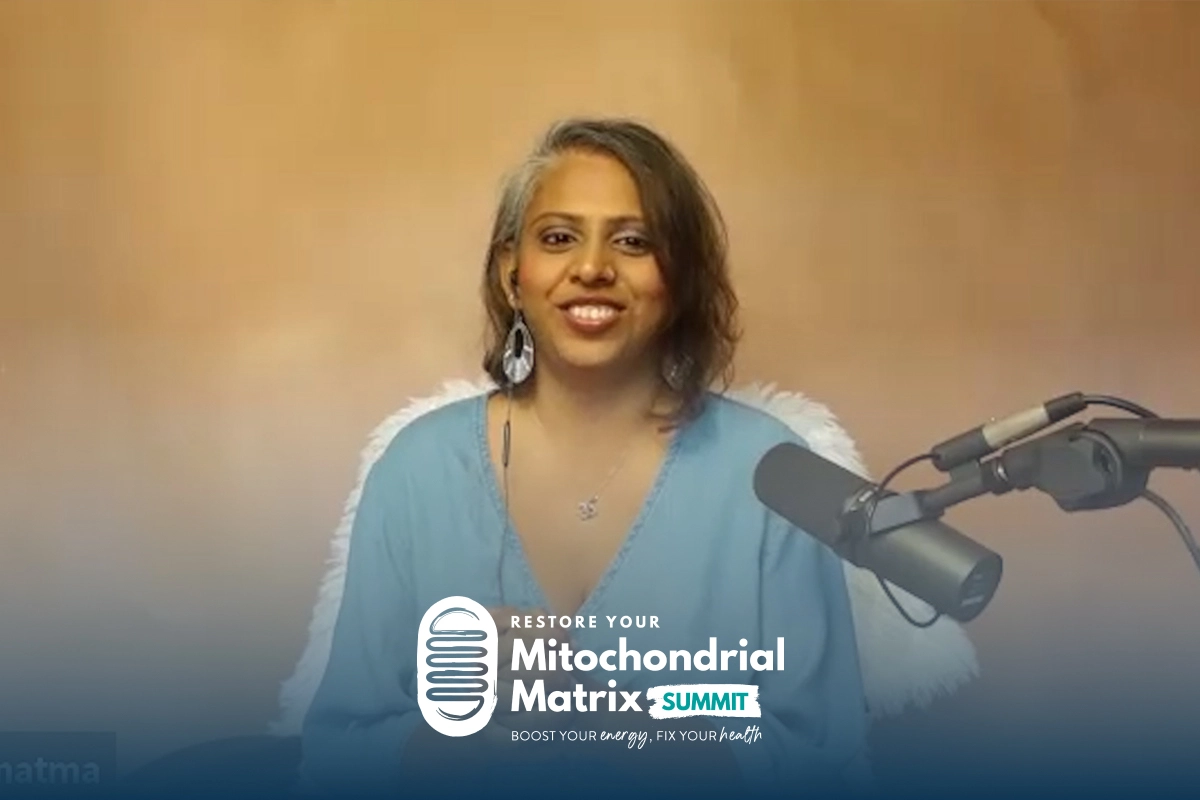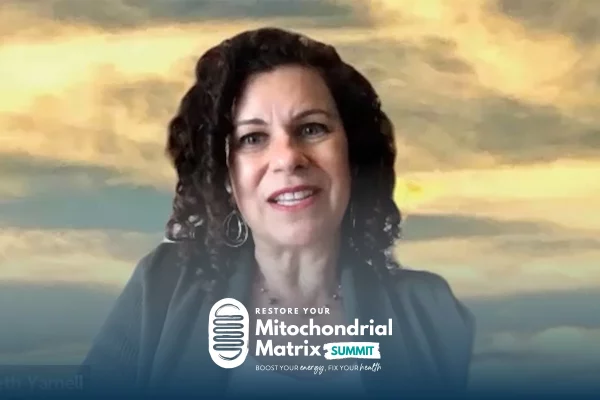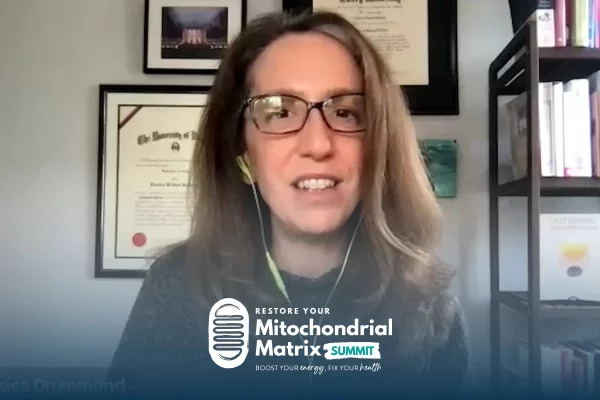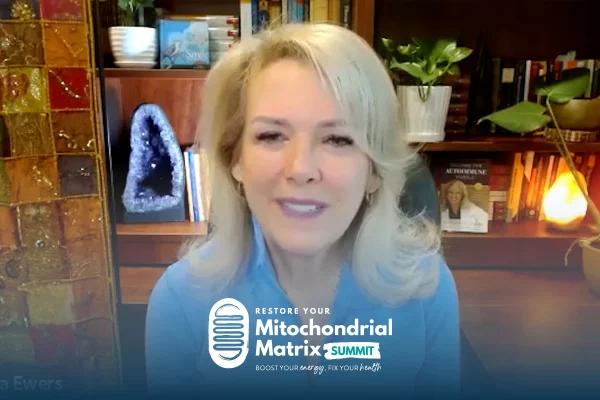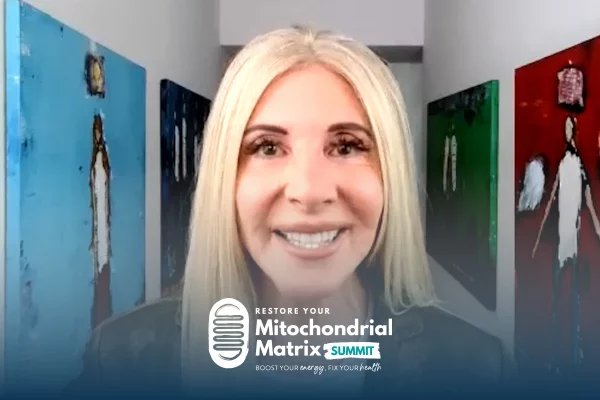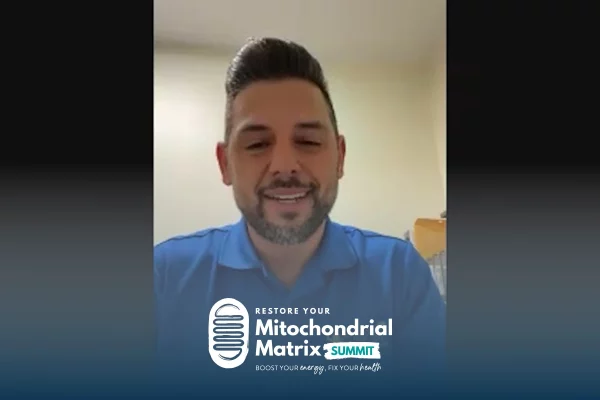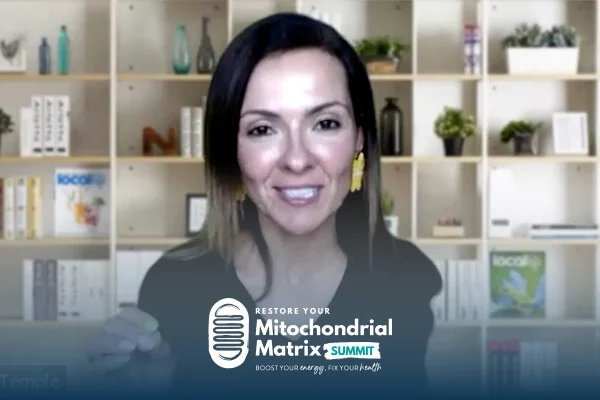Join the discussion below
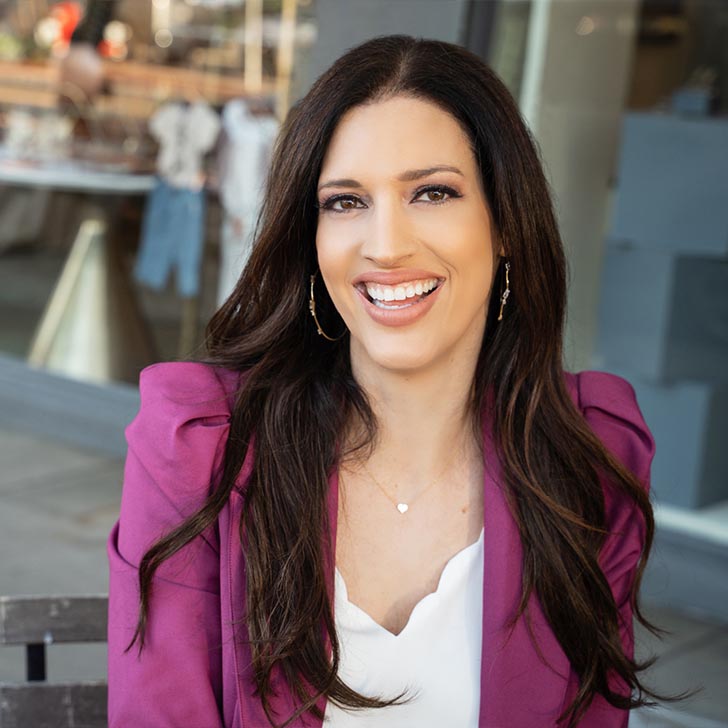
Laura Frontiero, FNP-BC, has served thousands of patients as a Nurse Practitioner over the last 22 years. Her work in the health industry marries both traditional and functional medicine. Laura’s wellness programs help her high-performing clients boost energy, renew mental focus, feel great in their bodies, and be productive again.... Read More

Aumatma Simmons, ND, FABNE, MS
Dr. Aumatma is a double board-certified Naturopathic Doctor & Endocrinologist, in practice for 15 years. Dr Aumatma supports badass power couples to create the family of their dreams, and also trains doctors who want to specialize in fertility. She is the best-selling author of "Fertility Secrets: What Your Doctor Didn't... Read More
- Fertility and mitochondria are connected.
- Learn ways to improve mitochondrial health to support fertility.
Laura Frontiero, FNP-BC
You’re watching the Restore Your Mitochondrial Matrix Summit. I’m your host, Laura Frontiero. And I’m bringing you experts with fresh ideas and proven methods to help you boost your energy and fix your health so you can build the life you love. And today, my special guest is Dr. Aumatma Simmons. Hi, Aumatma, welcome to the summit.
Dr. Aumatma Simmons
Hi, Laura, thanks for having me.
Laura Frontiero, FNP-BC
Oh, I’m so excited because not only are you just amazing at what you do, you’re a friend of mine, too, and it’s so fun to bring you on and talk about this. Now, want everybody to know who you are. You’re pretty impressive. You’re a double board-certified naturopathic doctor and endocrinologist. And your whole thing is about supporting power couples to create the family of their dreams. And you also have this other thing you do, you train doctors who wanna specialize in fertility, so pretty amazing. You’ve got a business that faces patients and another side of your business that helps practitioners. And, you know, you’re all over the place. You’re the best-selling author of “Fertility Secrets: What Your Doctor Didn’t Tell You About Baby-Making,” and you’re on a mission to help bring healthier babies into the world by creating healthier parents. You’ve been featured on ABC, Fox, CBS, KTLA, MindBodyGreen, and The Bump as a holistic fertility expert. So excited to have you here, so.
Dr. Aumatma Simmons
Thank you.
Laura Frontiero, FNP-BC
Tell us a little bit about you and what brought you into this. And then, what we’re gonna do is we’re gonna talk about fertility and mitochondrial health. We’re gonna talk about women wondering how to increase their egg quality, and mitochondria being really important to that piece-
Dr. Aumatma Simmons
Absolutely.
Laura Frontiero, FNP-BC
and supporting fertility. But first, let’s talk about you, and tell me about you.
Dr. Aumatma Simmons
Sure, so I got into fertility, I was already practicing naturopathic medicine for about five years by that point. And I had just married someone. We had been together for a long time, got married. It was kind of a roller coaster ride to the wedding. And then, just like after the wedding, he started talking about having kids. And I was like, wait, what? We didn’t talk about kids. And I was one of those like, young women that was like, no, I’m good. I don’t need to have kids, you know? So it wasn’t the calling for me. But when he started talking about kids, I was like, whoa, I need to really take a look at this. And literally every time he mentioned children, my uterus would just turn and wanna run the other direction. And I was like, okay, that’s not a good sign. So I had really my intuition telling me that was not gonna happen, that was not a good idea. And thank God, I did not let it happen with that person. But it also sent me down this rabbit hole of looking into what is fertility, what can I do for it. And really, like what I had been taught in naturopathic medical school was, oh, your fertility’s gonna drop off of a cliff at 35. Make sure you have kids. You know, just like the same thing that everyone else learns. And as I was doing my research, I really came to a different understanding, and just realizing that actually, that 35 myth starts in the 1800s in France, not in science, but in churches. There are literally like records of Catholic churches that say that women stop bringing their children to get baptized after the age of 35, so fertility must obviously drop off of a cliff at 35. But if you’re thinking about the 1800s, people didn’t really have kids that old. Like, they were starting on their family journeys earlier. Weren’t waiting till later in life. And like, what was our lifespan in the 1800s? So just a lot of questions that I was like, wait, what? This isn’t even science. So then, going on a hunt for actual studies. And there are now studies, small scale, but studies that show the difference between 25 to 29-year-olds and 35 to 39-year-olds, and actually, there’s only a 3% decline in fertility, so.
Laura Frontiero, FNP-BC
3%.
Dr. Aumatma Simmons
3% decline.
Laura Frontiero, FNP-BC
That’s it? So I come from the, of course, I’ve lived in the Western medical world for 20 years before I branched into functional medicine. And you know, in the Western medical world, we talk about being 35 as high-risk, right? You’re a high-risk-
Dr. Aumatma Simmons
Mm-hmm, oh, yeah.
Laura Frontiero, FNP-BC
pregnancy, or a high-risk OB. It’s really like almost shaming, frowned upon. The minute you walk into the office pregnant, it’s like, whoa, are you really, you’re pregnant at this age, like, right?
Dr. Aumatma Simmons
Yes, yep. Yeah.
Laura Frontiero, FNP-BC
I was 30.
Dr. Aumatma Simmons
Why did you wait so long?
Laura Frontiero, FNP-BC
I know, I was-
Dr. Aumatma Simmons
I literally had patients 40 plus, 42, 43, 45, patients going to the fertility clinic, and the doctor is literally like, “Why did you wait so long?”
Laura Frontiero, FNP-BC
Yeah, totally. I can remember-
Dr. Aumatma Simmons
They’re like, “Well, I didn’t have the right partner,” or, “Life happened,” or whatever. Like, why do I need to explain myself to you?
Laura Frontiero, FNP-BC
Yeah, oh, it’s so fascinating. All right, so let’s jump into the nitty-gritty here. So basically, we’ve established that it’s BS that you can’t get pregnant in your 30s and beyond. So let’s talk about our big topic today, which is mitochondria. Mitochondria energy, mitochondria for health, mitochondria, mitochondria, mitochondria. We keep hearing about it from every expert that’s coming on. And it seems like it’s really important to every aspect of health, and everything you’re trying to accomplish. It’s really foundational. So how does your mitochondria affect fertility?
Dr. Aumatma Simmons
Well, mitochondria are essentially crucial to fertility because our oocytes contain 100,000 mitochondria. So it’s like the oocytes, which is essentially like the egg, right? The egg that will eventually be mature and be ovulated, that egg has 200 times the mitochondria of anywhere else in the body. So if we think about what’s happening there, always physiology informs function, right? So our biology created these eggs with massive numbers of mitochondria because the mitochondria are crucial to the survival of the egg, the development of the egg, and the health of the future baby. So if we don’t look at mitochondrial health, and obviously, like all over the body, but specifically in the oocytes that are gonna develop, then we are not looking at the full picture, right, so.
Laura Frontiero, FNP-BC
It’s so fascinating because, you know, all the experts have coming on, we always talk about brain being your highest amount of mitochondria per cell. And what I’m hearing from you is there’s actually one spot where it’s even higher, and obviously, only women have this ability. Men don’t have oocytes.
Dr. Aumatma Simmons
Right.
Laura Frontiero, FNP-BC
So, so fascinating.
Dr. Aumatma Simmons
Yeah, it is. It is fascinating. And it’s really like, the mitochondria are really gonna help determine the health of the egg quality and the future baby. So, for me, it’s like, you know, you read it in my bio. It’s like, what I’m about is the healthier babies, right? And the way to get there is healthier human beings that are procreating. So if we’re really focused on like, how do we improve fertility, part of that has to be really assessing mitochondrial health and improving mitochondrial health and knowing that that’s gonna help improve egg quality.
Laura Frontiero, FNP-BC
So I think I’m hearing that if you’ve done some unhealthy stuff in the past and maybe harmed your mitochondria, there’s hope. We can work on this. We can fix this.
Dr. Aumatma Simmons
Yeah, yeah, yes, yes and no. Yes, we can fix it to a certain extent. And what I find is that just so many of the couples that are struggling with fertility now, probably in their 20s, were living lives that weren’t really conducive to fertility, let’s just, without any judgment. ‘Cause like, we were maybe partying. We were maybe, a lot of the women that are struggling with fertility are a little bit like me, type A badasses that really did not think about having children or plan for children until later in life. So it’s the stress as well as like, the to-do lifestyle, like do, do, do, do, do, will kind of deplete overall health and optimal health functions. But then you add to it the things that are really detrimental to mitochondrial health or egg quality. We can kind of even use them interchangeably a bit because the things that will support the mitochondria also support egg quality. So if we did these things that maybe have impacted and depleted our fertility for years, it may take a little bit of time to get all of that functioning again. That’s not to say it can never happen, but it makes it harder. And then, if we do all of the things that will help to improve, we really have to plan for it to a certain extent because it’s not like, oh, I’m just gonna decide that I want a child, and then get a child. It’s like, really, are we putting in the time and energy that it’s gonna take to repair the damage that was caused by the lifestyle that we were living for 20 years, and at least give a few months of focus, attention on improving that before getting pregnant, right? And people stress out when I say give a little bit of time. But like, I can give myself as an example. I worked on my fertility for a year before we even tried. For a whole year, I was like, we’re gonna try to have a baby soon. And this is my now husband. He knew before I did. He was like, “I wanna have a child, let’s do this.” And I was like, “Not yet,” “Not yet,” “Not yet,” “Not yet.” And literally for a year, I was like, okay, I gotta go through all the steps that I put my clients through, and we don’t take them, we don’t have to take a year. I just do it slower because I’d like fall off, then get back on, fall off, get back on. So doctors make the worst patients. But I did commit to the process until I felt like, okay, I’ve optimized every single piece of the puzzle, now I can go and try to get pregnant. And sure enough, it worked very quickly for us. But I feel like the amount of time and energy that I spent making sure that we would, that I was in the right state of health was really important. ‘Cause I knew that I had not lived the lifestyle that was going to be conducive to fertility, from just the aspect of stress, type A-ness, perfectionism. Like, all of the things that I knew that I needed to work on, I was like, okay, I gotta work on all this. And that’s the same for our clients. So it doesn’t have to be a year, but at least give yourself four months is the minimum because that’s the changeover of the eggs, right? So it takes about four months to really develop new eggs that are better quality.
Laura Frontiero, FNP-BC
Okay, so in that four month period of time, give us some tips to support your mitochondrial health, which is the same as supporting egg health, so.
Dr. Aumatma Simmons
Yeah.
Laura Frontiero, FNP-BC
Let’s talk about that. What are you having people do?
Dr. Aumatma Simmons
Yeah, so I’ll start with the foundations, and then we can move higher and higher up. So the first foundational thing is sleep. And for me, I feel like that’s the core of everything that I preach. Sleep needs to be, ideally, the right amount of time for you, which can be seven to nine or 10 hours for some people, and then it’s restorative. So it really takes into account, like the best question to ask yourself is, do you wake up rested in the morning? And if you don’t, if you feel tired, if you feel drained, if you feel like, oh my God, if I don’t get my triple espresso, I’m going to keel over and die, then you don’t feel so good. So there’s that level of work to do. The tips around sleep optimization, like you guys have heard this before, like making sure the room is dark, cutting out the blue lights, or getting blue light filter glasses before you go to bed. So for, at least around sunset, essentially, you wanna have some blue light filters. And then in the morning, this is the part that is less commonly known, is getting full spectrum light first thing in the morning, which really helps to turn off melatonin and switch to cortisol. And this back and forth switch from cortisol to melatonin is crucial to overall health. I’m sure you’re talking about it all day. And then, from the fertility side, the melatonin is actually one of the most potent antioxidants that our body inherently produces. So while we’re sleeping, the ovaries are actually getting this message to rejuvenate, and that message is melatonin. So melatonin like, yes, produced in the brain, helps us sleep, all of that. But it’s actually flooding the reproductive system and giving this message of restoration and like, just good quality healing. I don’t know-
Laura Frontiero, FNP-BC
Yeah, it’s so important.
Dr. Aumatma Simmons
what else to call it.
Laura Frontiero, FNP-BC
So melatonin doesn’t get enough credit for how important it is in our bodies, and for detoxification as well. It’s so good.
Dr. Aumatma Simmons
Yeah, yeah.
Laura Frontiero, FNP-BC
So what I’m hearing you say is my blackout curtains in my room, that I wake up to a completely dark room, probably isn’t the best way to start feeling amazing in the morning.
Dr. Aumatma Simmons
No, that’s good. And as soon as you wake up, just open the curtains, right?
Laura Frontiero, FNP-BC
Immediately, yeah.
Dr. Aumatma Simmons
Yeah.
Laura Frontiero, FNP-BC
I keep thinking, though, maybe I should get rid of those blackout curtains and have something, ’cause it’s dark out, it’s dark enough outside my windows, maybe I should just wake up to natural sunlight.
Dr. Aumatma Simmons
Hmm, yeah, it’s really interesting ’cause I feel like kids do this naturally. I watch my almost four year old. He’s very like, “Mom, it’s sunny outside.” And I’m like, “I’m gonna kill you, kid,” ’cause it’s like 6:45 in the morning. He’s literally waking up the minute the sun is rising. He is like, up. And, of course, we would love to sleep a little bit longer, but if we’re in sync with the rhythms, then really that sunset to sunrise is the optimal time for rest. And then, when the sun rises, your body naturally wakes up.
Laura Frontiero, FNP-BC
Yep, so good. Okay, so what else? So now we’ve covered sleep.
Dr. Aumatma Simmons
Sleep.
Laura Frontiero, FNP-BC
All right.
Dr. Aumatma Simmons
That was sleep. Food is probably the second pillar. And food, ideally, is organic, not processed, non-GMO, the basics, right? Outside of that, there are lots of potential blocks when it comes to food. So we might have food that we think is healthy, but is actually inflaming our bodies, and not really supporting the mitochondrial function. So if you know that certain foods are inflammatory for you, stay away from them. The common ones are like, dairy, gluten, soy, right? Like corn, the things that are commonly inflammatory. And then, I would put sugar as probably the most inflammatory. And sugar is sneaking in everywhere. So it’s not just like, oh, I don’t eat sweets. I don’t eat pastries. I don’t eat cookies. But your pasta sauce has sugar in it. I went through this like-
Laura Frontiero, FNP-BC
Your salad dressing, your marinara.
Dr. Aumatma Simmons
Yeah.
Laura Frontiero, FNP-BC
Bread, it’s everywhere.
Dr. Aumatma Simmons
It’s everywhere, and we might think, oh, it’s such a small amount. But it’s literally like, I can’t remember the stat I heard, but we consume tons and tons and tons of sugar. And I was like, wait, I don’t contribute to that U.S. statistic, so there are probably people like me, and that means other people are eating way more sugar. So I usually say like, the upper limit on daily sugar intake is nine grams of sugar. I usually try to keep it below that if I can. And I have my vices too, so.
Laura Frontiero, FNP-BC
Yeah, if we’re being honest, most of us are eating more sugar than we admit to our practitioner, to our partners, to any, I mean, it happens.
Dr. Aumatma Simmons
Yeah, yeah.
Laura Frontiero, FNP-BC
Yeah.
Dr. Aumatma Simmons
Yeah, it’s amazing how much we’re eating, and sometimes we’re not aware of it. So I feel like when I first got onto the kick, and this is the year that I spent cleaning out my life, my diet, like, literally everything, all of the different pieces. I worked through it for myself, and I was like, oh my God, there’s sugar in everything. Like, wait, I can’t eat that anymore? Are you serious? It’s not even sweet. But all of these things have sugar so that we can be addicted to them. It’s like we keep going back to the things that we think are, oh, like, this is my savory treat. And actually, it has sugar in it to keep you hooked in, so.
Laura Frontiero, FNP-BC
Oh, yeah, food manufacturers are smart. I always say they want you just come back and spend more money, so they’re gonna make sure that your brain is hooked on the food. And that’s why they’ve got a whole team of scientists perfecting the addiction of the food, the right amount of sugar and salt to just make you crave it.
Dr. Aumatma Simmons
Crave more, yeah.
Laura Frontiero, FNP-BC
Buy it again.
Dr. Aumatma Simmons
Yeah, yeah.
Laura Frontiero, FNP-BC
Buy it again, yep.
Dr. Aumatma Simmons
Yeah, it’s pretty nuts. So finding the foods that are inflammatory, getting rid of those foods. What I have seen in, just to think about how this links back to fertility, so inflammation in the gut will cause global inflammation in the body, will also cause, on occasion, not all the time, but often, we see that the impact on fertility will either be poorer egg quality or what I call eggs go to sleep. Like, they literally just tap out, and they’re like, oh, I’m not doing this. And the way we notice the change is that AMH will go down or will be low when we start working with people.
Laura Frontiero, FNP-BC
Tell us what AMH is.
Dr. Aumatma Simmons
Oh, good question. Sorry, anti-Mullerian hormone. That’s the key hormone that Western medicine uses as the pinpoint number to assess how good your chances are of conception. It is a terrible way to assess fertility. But if we understand what it is, then we can say, okay, we can see if it goes up or down, depending on what we’re doing. It’s essentially the signal that the eggs send out, the little oocytes, pre-developed, they’re sending out this signal saying, hey, I’m here, check me out. And the more of the signal there is, the more oocytes there are in our ovaries. So the idea is that as we are aging, quote, unquote, the number of oocytes is decreasing, so AMH is also decreasing. When AMH became popular in the field of fertility, with the advent of IVF. So, as they started doing IVFs and studying it and all of that, they were like, oh, when AMH is below this particular number, that number is 1.06, when AMH drops below that, we have really crappy outcomes on our IVF cycles. And so, a lot of the women that we work with who have low, supposedly low AMH, will be told either that they need egg donors or they’re being rushed into an IVF cycle when it’s really well-known and well-studied that if that AMH is below one, it’s really not gonna be a great fit. But they can get pregnant naturally, no problem. So AMH is a little bit of a farce, and a little bit gets too much, too much credit. But where I see it being important is if we can see like, oh, your AMH is kind of low. We do see gut inflammation. There’s these underlying things that are happening, that is going to impact how high or low your AMH is. So, as we improve the inflammation, your AMH can go up, which most women have been told that’s impossible. It’ll never happen. I’ve talked to doctors and they’re like, “Oh, that one time was just a fluke.” And I’m like, “No, it’s not just one time. Thank you very much.” So it’s really addressing the inflammation, and especially the stuff that’s coming up from the food that we’re eating is gonna help support better fertility. AMH, can we guarantee that it’s gonna go up? No, because not everyone has inflammation. But if inflammation was one of the factors that was happening and we remove it, boom, AMH goes up.
Laura Frontiero, FNP-BC
Oh, so cool. So you’re taking out the inflammatory foods. You’re helping people sleep. What else is important? Fixing fertility, which means fixing mitochondria. The beauty is, I love it when we can kill two birds with one stone. So if you are watching this and you want to grow your family, start a family, and you’ve got other health conditions going on, by fixing your mitochondria, you’re literally fixing your fertility at the same time. So I love this. So what else can they do?
Dr. Aumatma Simmons
So the next tier would be detoxification. And this is not like, not necessarily the hint to go and get a detox kit from Whole Foods or something like, please don’t.
Laura Frontiero, FNP-BC
Or do a week-long juice cleanse. It kills me, yeah.
Dr. Aumatma Simmons
Yeah, but if you, if you want to detoxify, you’re really looking at the things in your environment that are deterring fertility, egg quality, sperm health, and mitochondrial function. And those things will be potentially things you’ve heard of. I think the biggest things right now in our environment are plastics. And I have some awesome, awesome, like motivated couples. Yesterday, I was talking to someone new. And she’s like, “But what am I gonna do? Like, all of our grass-fed organic meat from Whole Foods is in plastic.” And I’m like, yeah. Like, there are some things that we may not be able to do anything about. But then I said, “And there are farmers’ markets and farms where you can get locally sourced meat.” And her husband’s like, “Yeah, honey, like, we have that farmers’ market right up the street. We can get meat from them.” And I was like, “Yeah, great, awesome.” So it’s like, those things sound like small things, but if you’re buying everything in a package, plastic thing, it’s probably not doing any favors. That plastic that leaches BPA or BPS, BPF. There’s a whole slew of bisphenol compounds that are being released into the food or the water or the liquids that you’re drinking, eating, whatever, that have an estrogen-like effect, A, so they’re negatively impacting hormonal health. B, they’re also destroying the microbiome in the gut. And simultaneously, like, as the gut microbiome gets distorted, the reproductive microbiome gets distorted. So then you have the vaginal, cervical, and uterine microbiome, which if it’s out of balance, makes it harder for implantation to happen, and harder for the baby to develop and grow. So all of that from plastic.
Laura Frontiero, FNP-BC
Right, so don’t drink your water outta plastic bottles.
Dr. Aumatma Simmons
Right.
Laura Frontiero, FNP-BC
When you go grocery shopping, come home and get stuff outta plastic and store it in glass. You know, it blows me away, like even when I go to Trader Joe’s, once you know something, you can’t unsee it, right? So when you go to Trader Joe’s, which is really popular across the country, and they have all these vegetables wrapped in plastic. Like your zucchini, so they’ve got it kinda wrapped. You buy three zucchinis-
Dr. Aumatma Simmons
Yeah, packaged.
Laura Frontiero, FNP-BC
at a time, packaged in plastic, instead of just loose, right? Where you just grab what you want.
Dr. Aumatma Simmons
Yeah.
Laura Frontiero, FNP-BC
And so you gotta think about this. All these packaging is a problem.
Dr. Aumatma Simmons
Right, right, exactly, exactly. So packaging, and then aluminum cans, which are lined with plastic so that, we know aluminum is not great for us, but now we line it with plastic, which is also not great for us. So really finding ways to not use plastic wherever possible. And outside of plastic, I would say the other things to detox, the average woman walks out of her house with 137 toxins applied onto her skin. So shampoo, conditioner, soap, makeup, literally like every single thing that we use has craptons of chemicals loaded in. A, that’s not good for the skin. So if you’re thinking about like, how to not have saggy skin when we get old. Like, the easiest thing is to switch out the products that we’re using. But then B, like really, our skin is the biggest organ. We’re absorbing all this stuff right into our bloodstream, which is okay if it was just one thing. But then you add this one and this one and this one and this one, and by the time you walk outta the house, you’re like, in a puddle of toxins. So getting rid of the things that we can get rid of. And I think we’re gonna offer, we’ll have a detox guide for anyone who’s like, oh my God, how do I get rid of this crap? Because honestly, I feel like everyone can use this. Trying for fertility or not, this is relevant to all of us because we’re all doing it. And should we not pay attention to the crap that’s going into our body, just ’cause we’re not trying to conceive? Probably no, like, for me, this is like-
Laura Frontiero, FNP-BC
Oh, yeah.
Dr. Aumatma Simmons
I’m gonna do this forever. This is not just for now.
Laura Frontiero, FNP-BC
Okay, yeah, so, yeah. Obviously, my specialty is not fertility. My specialty is energy and gut health and all the chronic health conditions that people have. And so, this is foundational to the work that I do as well. Even though I’m not trying to help people get pregnant, that’s not my main focus. It’s all about changing this environment that we’re exposed to.
Dr. Aumatma Simmons
Right.
Laura Frontiero, FNP-BC
And then you mentioned something like, don’t just go out and buy like a detox kit from Whole Foods. If you and your practitioner together realize that, you know, through lab testing typically, or that you need detoxification, that is a very guided, specialized process with giving you detoxifying strategy in the right order so that you don’t bottom out your health. Do you wanna talk a little bit about that?
Dr. Aumatma Simmons
Yeah, yeah, so there are a couple of things. One is that the clients that we do put on a detox, ’cause sometimes we will choose like, actually, this is the right thing for us to do, and sometimes it is intensive juice fasts or whatever, but we’re not using fruit, right? Like, fruit juice is the worst way that we could be trying to detox. But we will use greens to help support liver function. There’s like, really specific ways to do it. But people are like, “Oh, you do a juice fast? Great, I can just go do a juice fast.” And I’m like, “No, because you have to prepare your body to go into it.” If you’re gonna go straight into a juice fast, people try to do this all the time, I can skip the other days. No, you can’t skip the other days. Like, they’re part of the plan. You really, like, any type of extreme fast, if your body isn’t prepared, is going to throw your adrenals so out of whack, your insulin, pancreatic function, that will take a long time to recover from. So that’s part A, the dangers of it. B is like, doing this on your own when there isn’t some sort of guidance and support to, even if, let’s suppose even you hear this, and you’re like, “Oh, I’m gonna do a green juice fast.” If you’re not supporting your detox through binders, like things to cage the chemicals and toxins that your cells are getting rid of, they’re recirculating in your system. The sequestering of toxins into fat cells is actually a survival mechanism. That’s what our body naturally does as a way to safeguard us from the toxins. So, as soon as you start releasing all of these toxins, but you don’t actually have good gut function to get all that crap out, you don’t have good liver function to help support getting the crap out, then you’ve just flooded your system with a bunch of toxins, now they’re like recirculated in your system, and causing more harm than anything else. So we really, like, if intensive detox is appropriate, and it’s not always appropriate for every person, it’s really not the thing that we say like, oh, everyone’s gonna go on this detox. No, it’s really specific for the type of goal that we’re trying to reach, and it becomes like a therapeutic thing, rather than like, oh, I’m just doing a detox, and it’s gonna help me feel better. Yes, sometimes detoxes work that way. But I feel like most of the time, any change that we make in our body, and people have said this forever. People will be like, “Oh, I used to be a vegan, and then I started eating meat, and I just felt so much better.” And then simultaneously, you’ll hear meat eaters say, “Oh, I used to do paleo, and once I started being plant-based, I feel better.” It’s like any break from the mundaneness that our gut is exposed to is gonna feel good. So the easiest, simplest way to do that on a regular basis is just making sure that you’re getting lots of variety in your diet, right? To get away from, oh, I eat oatmeal for breakfast, and a sandwich for lunch or a salad, and then meat and vegetables and rice for dinner. Like, really trying to switch it up so that A, your gut is being exposed to lots of different foods. Those foods ideally are not causing inflammation. And the chances are gonna be lower if it’s gonna be a food that your body doesn’t see every single day. See, as in like, be exposed to. So variety, and then the additional bonus of variety is really like, 30 different plant foods in a week actually give you all of the antioxidants that you need to support mitochondrial health.
Laura Frontiero, FNP-BC
Yes.
Dr. Aumatma Simmons
So.
Laura Frontiero, FNP-BC
So let’s wrap up with those nutrients that are helpful for your-
Dr. Aumatma Simmons
Okay.
Laura Frontiero, FNP-BC
mitochondrial function.
Dr. Aumatma Simmons
Okay, great. Yes.
Laura Frontiero, FNP-BC
You just like, segued right into that.
Dr. Aumatma Simmons
Awesome, so probably my, there are a lot of antioxidants, and the fertility world is full of like, just take this, it’s gonna help your fertility. But notice that it’s the top tier. It’s not every single person needs every one of these nutrients. So I just wanna couch this with like, if you are trying to conceive, please, please, please do not go out and buy every single thing that I say here. It’s not going to be the end-all, be-all. It’s really like, targeted therapies for very specific goals. With that said, my favorite antioxidants, I will start with, probably top number one, I cannot live without this, is glutathione. Glutathione is one of the most potent antioxidants for mitochondrial health, and is really, really incredible for egg quality. So glutathione’s my favorite. NAC is N-acetylcysteine. That’s a close second. NAC is a precursor to glutathione, so there’s that. NAC can also be really specifically helpful for people with PCOS. There’s a fair amount of research with NAC and PCOS, so that might be good. The next one, or I’ll like, just put in a category, which is all of the alpha-lipoic acid, acetyl-L-carnitine, green tea extract, ECGC. There’s a bunch that are all great antioxidants. And then, the last one I’ll highlight is CoQ10 because literally every woman with fertility is on CoQ10. And CoQ10 can be super helpful. Like to be fair, that nutrient has a lot of studies, and a lot of studies that say, oh, it’s helped with natural fertility, it’s helped with IVF cycles. Why not just take it? So CoQ10 might be really, really wonderful. What I find most often is that there are imbalances in the antioxidant levels. So if you way upregulate CoQ10, but you’re deficient in things, basic ones like vitamin E and vitamin C, which are foundational to fertility health, you are then, you know, not really doing yourself any favors by way increasing one, but not having a balanced level of the others. So if egg quality is an issue, I always say the best, easiest approach is to get tested, know what your nutrient levels are, and then we can tinker with the exact nutrients as needed.
Laura Frontiero, FNP-BC
Absolutely.
Dr. Aumatma Simmons
There’s a few others that are like berries. Goji berries, acai berries, things like the really dark, deep red and purple fruits will offer high levels of antioxidants that are supportive to egg quality. So that might be another, you know, additional antioxidants to explore.
Laura Frontiero, FNP-BC
Right, and remember, when we’re talking about egg quality, we’re also talking about mitochondrial support-
Dr. Aumatma Simmons
Mitochondrial, yeah.
Laura Frontiero, FNP-BC
because they go together, everybody. Well, you have dropped some major pearls and support for our viewers. Thank you so much, Aumatma. Is there anything you’d like to say in closing?
Dr. Aumatma Simmons
No, this was great. I will say this, what we’ve laid out today, is supportive to fertility. So if you’re trying to conceive, awesome, use the tips and tools and all of that. If you’re not trying to conceive, or it’s way in the future for you, no problem. Do these things now because living this way is going to support future fertility. And if you’ve already had your babies, cool, no problem. Keep doing the mitochondrial support because our mitochondria are not going away.
Laura Frontiero, FNP-BC
No.
Dr. Aumatma Simmons
They are like, crucial to our health, so.
Laura Frontiero, FNP-BC
They are, they are.
Dr. Aumatma Simmons
I am so glad that you’ve done this summit because I think that mitochondria are just like, probably one of the core pieces of energy, overall health, and just healthy aging, and all of that. Like I think, yeah. I just think this is gonna make such a big difference for so many people, so.
Laura Frontiero, FNP-BC
Yes, thank you so much, Aumatma. Thank you for being a part of this, and we’ll connect soon. Bye, now.
Dr. Aumatma Simmons
Yay, thanks for having me.
Downloads
